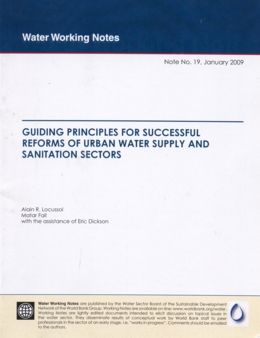|
 The primary objective of this report is to provide practical guidance to World Bank teams advising on the design and implementation of reforms of urban water supply and sanitation (WSS) sectors. This report includes three main chapters to discuss how to measure the performance of an urban WSS service, explain apparent performance gaps, if any; and design and implement reforms to increase access to the infrastructure, improve the efficiency of operations and enhance the reliability, sustainability and affordabilityof the service. As already mentioned, this report builds on several pieces of analytical research already published (or about to be published) by the Bank on topics such as stakeholder consultation, governance of public service providers, service efficiency, public-private partnerships, financing, and economic regulation. The report illustrates the various topics covered with specific cases of reforms, or consequences of lack of reforms. Table of Contents: Introduction Executive Summary 1. Measuring the Performance of the Water Supply and Sanitation Service 2. Understanding the Reasons for Apparent Performance Gaps 3. Designing and Implementing Succesful Urban Water Supply and Sanitation Sector Reforms References Annexes Post Date : 01 Juli 2009 |